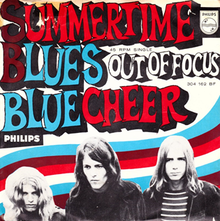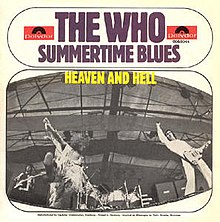
Ray Edward "Eddie" Cochran was an American rock and roll musician. His songs, such as "Twenty Flight Rock", "Summertime Blues", "C'mon Everybody" and "Somethin' Else", captured teenage frustration and desire in the mid-1950s and early 1960s. Cochran experimented with multitrack recording, distortion techniques, and overdubbing, even on his earliest singles. Cochran played the guitar, piano, bass, and drums. His image as a sharply dressed and attractive young man with a rebellious attitude epitomized the stance of the 1950s rocker, and in death, Cochran achieved iconic status.
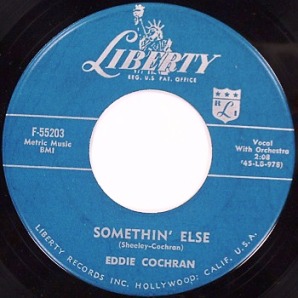
"Somethin' Else" is a song by the rockabilly musician Eddie Cochran, co-written by his girlfriend Sharon Sheeley and his elder brother Bob Cochran, and released in 1959. It has been covered by a wide range of artists, including Johnny Hallyday, Led Zeppelin, and the Sex Pistols.

"You've Really Got a Hold on Me" is a song written by Smokey Robinson, which became a 1962 Top 10 hit single for the Miracles. One of the Miracles' most covered tunes, this million-selling song received a 1998 Grammy Hall of Fame Award. It has also been selected as one of The Rock and Roll Hall of Fame's 500 Songs that Shaped Rock and Roll. It was recorded by the Beatles for their second album, With the Beatles (1963). Many other musicians also recorded versions.
"Last Kiss" is a teenage tragedy song written by Wayne Cochran and first recorded by Cochran in 1961 for the Gala label. Cochran's version failed to do well on the charts. Cochran re-recorded his song for the King label in 1963. It was revived by J. Frank Wilson and the Cavaliers, who took it to number two on the Billboard Hot 100 charts. Wednesday, Pearl Jam, and several international artists also covered the song, with varying degrees of success.

"Piece of My Heart" is a romantic soul song written by Jerry Ragovoy and Bert Berns, originally recorded by Erma Franklin in 1967. Franklin's single peaked in December 1967 at number 10 on the Billboard Hot Rhythm & Blues Singles chart in the United States.

"You Send Me" is a song written and originally recorded by American singer Sam Cooke, released as a single in 1957 by Keen Records. Produced by Bumps Blackwell and arranged and conducted by René Hall. The song, Cooke's debut single, was a massive commercial success, becoming a No. 1 hit on both Billboard's Rhythm & Blues Records chart and the Billboard Hot 100.
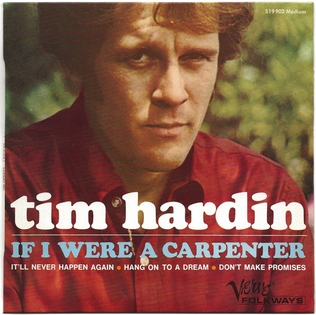
"If I Were a Carpenter" is a folk song written by Tim Hardin in the 1960s, and re-recorded with commercial success by various artists including Bobby Darin, The Four Tops and Johnny Cash. Hardin's own recording of the piece appeared on his 1967 album Tim Hardin 2. It was one of two songs from that release performed by Hardin at Woodstock in 1969. The song, believed by some to be about male romantic insecurity, is rumored to have been inspired by his love for actress Susan Morss, as well as the construction of Hardin's recording studio.

"Fly Like an Eagle" is a song written by American musician Steve Miller for the album of the same name. The song was released in the United Kingdom in August 1976 and in the United States in December 1976. It went to number two on the US Billboard Hot 100 for the week of March 12, 1977. The single edit can be found on Greatest Hits (1974–1978). It is often played in tandem with "Space Intro". On the album, the song segues into "Wild Mountain Honey".
"Brand New Cadillac" is a 1959 song by Vince Taylor, and was originally released as a B-side. Featured musicians on the released recording were: Joe Moretti (guitars), Lou Brian (piano), Brian Locking (bass) and Brian Bennett (drums). While not successful in the UK, it got a huge surge in popularity in continental Europe, especially the Nordic countries, with acts such as The Renegades and Hep Stars bringing it to number one in Finland and Sweden respectively. Another Swedish act, the Shamrocks brought the song to number one in France.

Who I Am is the fifth studio album by American country music artist Alan Jackson. The album was released on June 28, 1994, via Arista Records. It features the Number One singles "Summertime Blues", "Gone Country", "Livin' on Love", and "I Don't Even Know Your Name", and the #6-peaking "Song for the Life".

"Da Doo Ron Ron (When He Walked Me Home)" is a song written by Jeff Barry, Ellie Greenwich and Phil Spector. It first became a popular top five hit single for the American girl group the Crystals in 1963. American teen idol Shaun Cassidy recorded the song in 1977 and his version hit number one on the Billboard Hot 100 chart. There have also been many other cover versions of this song, including one by the songwriters Jeff Barry and Ellie Greenwich themselves, performing as the Raindrops.

"Donna" is a song written by Ritchie Valens, featuring the '50s progression. The song was released in 1958 on Del-Fi Records. Written as a tribute to his high school sweetheart Donna Ludwig, it was Valens' highest-charting single, reaching No. 2 on the Billboard Hot 100 chart the following year.

"C'mon Everybody" is a 1958 song by Eddie Cochran and Jerry Capehart, originally released as a B-side.

"Rock On" is a song written by English singer David Essex. Recorded in 1973 and released as a single by Essex, it became an international hit. In 1989, American actor and singer Michael Damian recorded a cover version that went to number one on the Billboard Hot 100 chart. The song has been recorded many times, including a 2006 version by the English hard rock group Def Leppard.

"Mercury Blues" is a song written by rural blues musician K. C. Douglas and Robert Geddins, and first recorded by Douglas in 1948. The song, originally titled "Mercury Boogie," pays homage to the American automobile marque, which ended production in 2010.
"Who's Cheatin' Who" is a country music song written by Jerry Hayes and initially recorded by Charly McClain. It was the title track of her 1980 album for Epic Records, released in November 1980 as a single with "Love Scenes" on the B-side, and in early 1981, was her first Number One hit on the Billboard country charts. 17 years later, Alan Jackson had chart success with the song as well, with his cover version reaching number two on the same chart.
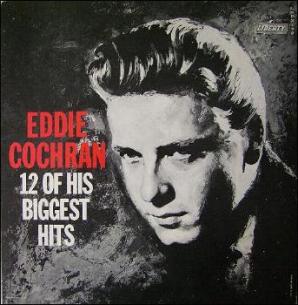
The Eddie Cochran Memorial Album is the second album by Eddie Cochran, released on Liberty Records in mono, LRP 3172, in May 1960. It had previously been issued as 12 of His Biggest Hits in April 1960 with the same catalogue number, but after Cochran's death on April 17 it was retitled and reissued, and has remained so titled ever since. It is currently in print on the Magic Records label in France, on CD on EMI-Toshiba in Japan, and on BGO in the UK as a twofer with "Singin' To My Baby."

"Sweet Music Man" is a song written and recorded by American musician Kenny Rogers. It appears on his 1977 album Daytime Friends, from which it was released as the final single.

"Can't You See" is a song written by Toy Caldwell of The Marshall Tucker Band. The song was originally recorded by the band on their 1973 debut album, The Marshall Tucker Band, and released as the album's first single. Record World called it "a strong rhythm item that continually builds and builds." A live version was released in 1977 and peaked at number 75 on the Billboard Hot 100. Cover versions of "Can't You See" have charted for Waylon Jennings and the Zac Brown Band with Kid Rock (2010).
"Farmer John" is a song written by Don "Sugarcane" Harris and Dewey Terry, and first recorded by the two as the American R&B duo Don and Dewey, in 1959. Although the original version of the composition did not receive much attention, it was reinvigorated by the garage rock band the Premiers, whose raving remake of the song was released in 1964. The song's raw and partying atmosphere was immensely popular, reaching number 19 on the Billboard Hot 100. Following the group's national success, several additional interpretations of "Farmer John" were released, making the tune a classic of garage rock.



